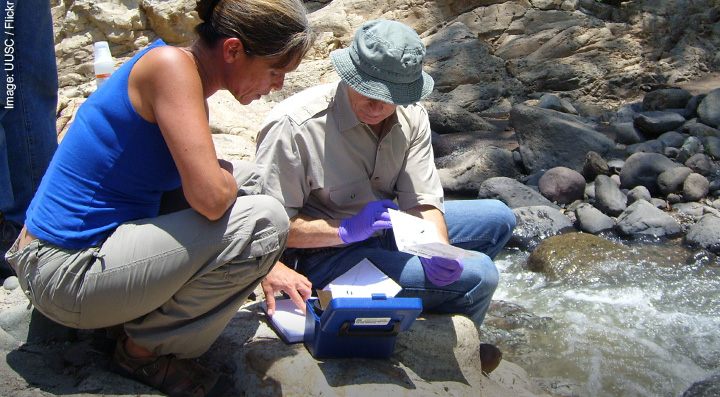Environmental Geology & Contaminated Land
Environmental geology
Environmental geologists apply geological principles to solving environmental problems of water and land on which people, animals and plants live, which may have resulted from human activities or natural processes.

 Roles & Career Profiles
Roles & Career Profiles
Environmental geologists or environmental consultants often work for engineering consultancy firms.
They undertake roles such as:

Environmental Consultant |

Environmental Risk Management |
| Read career profile | |

Environmental Geochemist |

Contaminated Land Specialist |
 Geoscience Areas
Geoscience Areas
Those employed in the environmental geology sector will utilise their knowledge of, and possibly specialise in, aspects of geoscience such as:
- Environmental Geochemistry
- Contaminated Land
- Geomorphology / Surface Processes
- Hydrogeology
Contaminated Land
- Environmental Management including licensing, permitting & waste management
- Site Investigation: planning, drilling, sampling and preservation, field and laboratory testing, and health & safety
- Contaminant hydrogeology
- Understanding of the Earth systems and geochemical cycles controlling movement of contaminants –some may also deal with radiological risks.
- Planning and implementing remediation projects including mine remediation
- Stakeholder engagement, project management, financing, valuation and insurance.
Many contaminated land investigation, assessment and remediation activities fall under the Engineering Geology discipline. Other inter-related disciplines include geotechnics, hydrology (drainage, and flood risk), ecology and geophysics.
Watch this video from the Contaminated Land Group to find out more about a career in this area.

 Roles & Career Profiles
Roles & Career Profiles

Contaminated Land Consultant |

Technical Officer Groundwater and Contaminated Land |

Contaminated Land Contractor |

Contaminated Land Lecturer |

Contaminated Land Regulator |
 Geoscience Areas
Geoscience Areas
Those employed in the contaminated land sector use their knowledge of Geoscience areas and related sciences such as:
- Environmental Geochemistry
- Geomorphology / Surface Processes
- Hydrogeology
- Stratigraphy
- Near Surface Geophysics
- Petrology - understanding of rock processes and permeability
- Soil science
- Ecology
- Modelling
- Field sampling and mapping



